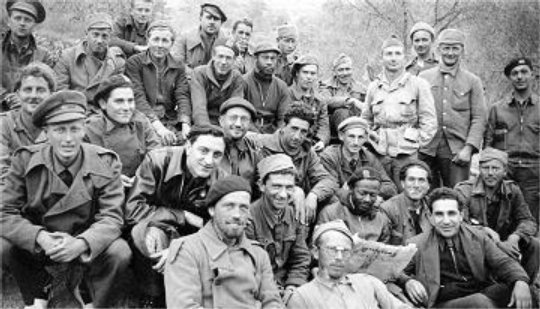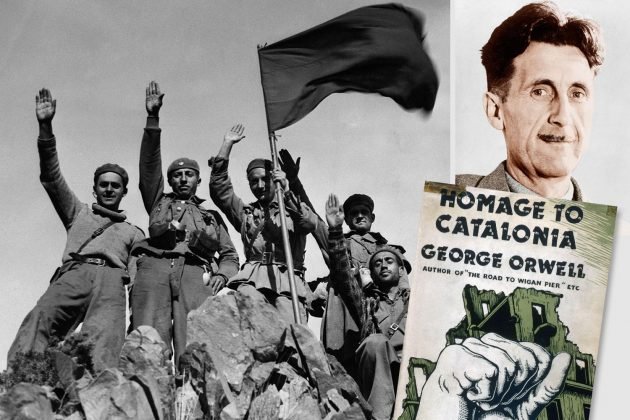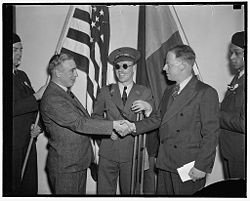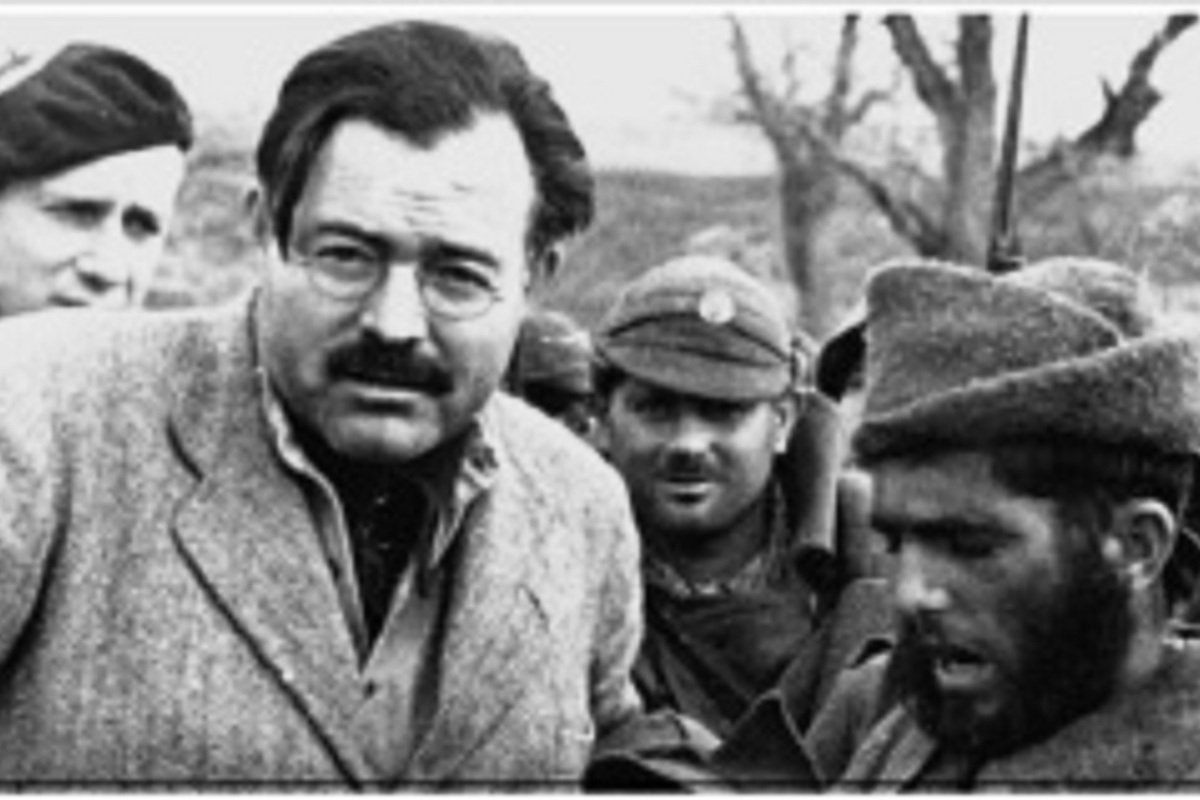Memorial Day: A Postscript for the Abraham Lincoln Brigade
Left to right: soldiers from the Abraham Lincoln Brigade, unlike the US Army of the time, racially integrated; Spanish soldiers and Orwell’s Homage to Catalonia; Robert Raven at a Brigade fundraiser, his eyes concealed; Hemingway in Spain
Between 1941 and 1945, the United States lost almost half a million of its citizens in the fight against fascism. But few years earlier, during the Spanish Civil War, seven hundred Americans had died in an effort to strangle it in its cradle. While the United States and the European powers hung back from the fight against Nazi-backed Francisco Franco, volunteers from across the world rushed to join it. The American contingent was the American Lincoln Brigade. While reporting in the war, Ernest Hemingway met one of the Brigade’s wounded. Below is a previously-posted account of the episode.
In a dispatch from Spain during its Civil War called “A New Kind of War,” Hemingway recounts a grisly scene. He was summoned to a hospital to visit a boy from Pittsburgh who’d had some bad luck. Damn bad luck, as Hemingway might have said.
“Where’s Raven?” I asked.
“I’m here,” said Raven.
The voice came from a high mound covered by a shoddy gray blanket. There were two arms crossed on the top of the mound and at one end was something that had once been a face, but now was a yellow scabby area with a wide bandage across where the eyes had been.
“Who is it?” asked Raven. He didn’t have lips, but he talked pretty well without them, and with a pleasant voice.
Raven told Hemingway that he had got his wounds from a Fascist grenade at the end of a nighttime firefight. Before the war, he said, he had been a social worker. Hemingway didn’t believe any of it. “I’d lied a little myself in my time. Especially late in the evening.”
One of the things Hemingway didn’t tell us was how a Pittsburgh boy found himself in a Madrid hospital without a face. He didn’t have to, then at least. His readers would have known the Pittsburgh boy was part of the Abraham Lincoln Brigade.
When the Fascist General Francisco Franco sought to overthrow the elected Spanish Republic in the name of King, Church, and Property, he immediately found allies in Hitler and Mussolini, who poured in troops and the latest in modern arms. The Republic appealed for help from abroad. Progressives and anti-fascists from around the world flocked to Madrid to join the International Brigades. The American unit was named after the martyred president. Many of its members were black. At the time, and even during the soon-to-come rigors of World War II, they would have been barred from combat in the segregated US Army. And many were Communists. At the time, so was Lucille Ball. It didn’t matter. All that mattered was that they wanted to fight the Fascists.
And fight they did. George Orwell was particularly bloodthirsty. In Homage to Catalonia, he wrote “When I joined the militia I had promised myself to kill one Fascist — after all, if each of us killed one they would soon be extinct.” And he walked the walk. Serving in a leftist unit, he took a sniper bullet to the throat that almost killed him. The International Brigades were deployed as shock troops—that is, the tip of the spear in any assault. As a result they suffered terrible casualties, and several commanders of the Lincoln Brigade died in combat.
I had assumed that Hemingway’s Raven was a fiction, or at most a composite standing in for all the American fallen. After all, he conceded that he was known to lie a bit, and he was a fierce propagandist for the Republican cause. (He later co-wrote The Spanish Earth and showed it to FDR at the White House in a push for US intervention. I’ve seen it so you don’t have to. Franklin was unmoved.)
I was wrong. There is an Abraham Lincoln Brigade Archive, and it publishes a newsletter. In 2011 it excerpted a letter from Margaret Palmer, the European art buyer for Pittsburgh’s Carnegie Institute, to the museum’s director. She recounts a visit to American wounded in Madrid. She met a young man from Pittsburgh named Robert Raven. His eyes and face were gone. They talked about art. “I too know a little about painting and bought a box of paints in France so that I could do some painting in Spain. But now” –he ended in a tone of quiet acceptance, and without complaint, “I shall have to dedicate myself to my music.”
In her letter, Palmer tells what Hemingway did not: how Raven was wounded. It was a grenade, but not a Fascist weapon. It had been his, and it went off in his hand. Hemingway probably left out the detail because it made a better story.
Maybe. But Robert Raven was no less a hero for it. Fascism was on the march and a Pittsburgh boy heard the call. He paid a terrible price without complaint.
Fascism is back. So far most of the fighting has been in the courts and in the legislatures. If it spills out into the streets, let’s hope there are more Robert Ravens to be found.



